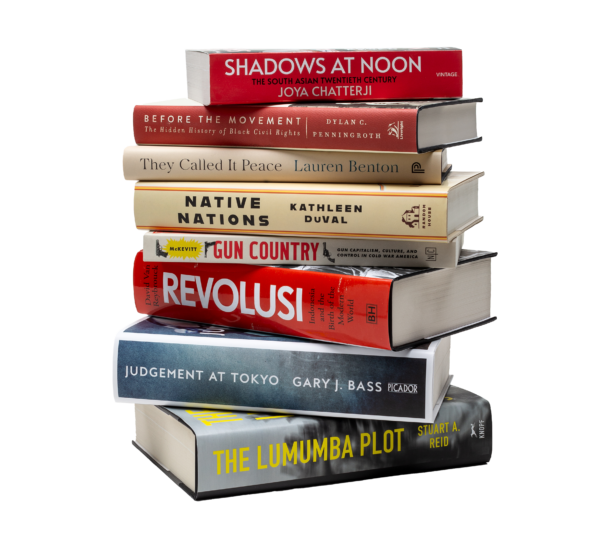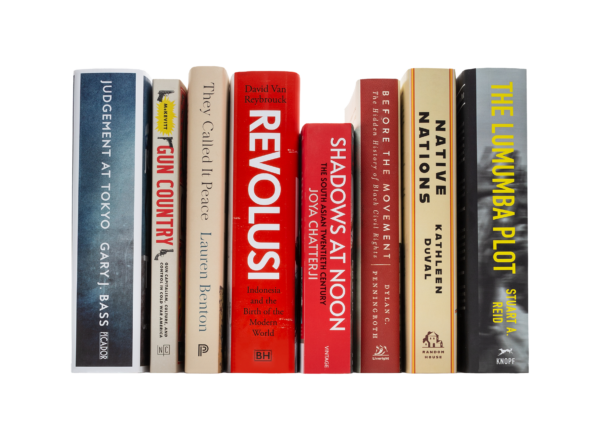September 4th 2024 in News
The 2024 Cundill History Prize Shortlist

From secret CIA plots to the hidden history of Black civil rights, from Indigenous American innovations to new takes on US gun culture and Indonesia’s struggle for independence, the shortlist for the 2024 Cundill History Prize celebrates books that “speak to major issues in the present day.”
The jurors for the 2024 Cundill History Prize are shining a light on stories that span the continents in an eight-book shortlist showing the range and excellence of current history writing. Chaired by Rana Mitter, the 2024 jury includes Nicole Eustace, Stephanie Nolen, Moses Ochonu and Rebecca L. Spang.
Administered by McGill University, the Cundill History Prize is the world’s leading prize for history writing. The US$75,000 prize is awarded annually to the book that embodies historical scholarship, originality, literary quality and diverse appeal.
Chair of Jury, Rana Mitter, said: “One element that stands out among the brilliant books on this shortlist is their timeliness. Although all are products of years of deep research, they touch on topics – the balance between freedom and responsibility, the need to account for and atone for war, the continuing rise of the Global South – that speak to major issues in the present day.”
Three university presses from the US feature on this year’s shortlist, with titles from Princeton University Press, University of North Carolina Press and Yale University Press. Independent publisher W. W. Norton in the US have two books featured on the list, with one published by their Liveright Publishing imprint. Penguin Random House and Alfred A. Knopf also in the US have one title each shortlisted. In the UK, The Bodley Head, an imprint of VINTAGE, is represented with two titles, and Picador, Pan Macmillan with one.
The 2024 Cundill History Prize Shortlist
- Judgement at Tokyo: World War II on Trial and the Making of Modern Asia - Gary J. Bass | Picador, Pan Macmillan
- They Called It Peace: Worlds of Imperial Violence - Lauren Benton | Princeton University Press
- Shadows at Noon: The South Asian Twentieth Century - Joya Chatterji | The Bodley Head, VINTAGE / Yale University Press
- Native Nations: A Millennium in North America - Kathleen DuVal | Penguin Random House
- Gun Country: Gun Capitalism, Culture, and Control in Cold War America - Andrew C. McKevitt | University of North Carolina Press
- Before the Movement: The Hidden History of Black Civil Rights - Dylan C. Penningroth | Liveright Publishing
- The Lumumba Plot: The Secret History of the CIA and a Cold War Assassination - Stuart A. Reid | Alfred A. Knopf)
- Revolusi: Indonesia and the Birth of the Modern World - David Van Reybrouck, translated by David Colmer and David McKay | The Bodley Head, VINTAGE / W. W. Norton

The struggle for national independence is a prevalent topic on this year’s shortlist, including titles such as Shadows at Noon by Joya Chatterji, which tells the story of South Asia’s journey from the British Raj, through independence and partition, to the forging of the modern nations of India, Pakistan and Bangladesh. After three centuries of Dutch colonial rule, Indonesia’s struggle for independence in the 1940s is explored in David Van Reybrouck’s Revolusi, which draws on hundreds of interviews and eye-witness testimonies to tell the staggering story of the Indonesian National Revolution. The Lumumba Plot by Stuart A. Reid guides us through the CIA’s secret plot to assassinate Patrice Lumumba, the democratically elected leader of the newly independent Congo, in a spellbinding work of history that reads like a Cold War spy thriller.
Histories of post-war societies rebuilding and reshaping in the wake of conflict are also highlighted. Andrew C. McKevitt’s Gun Country recasts the story of guns in post-war America, fueled by a booming consumer market of cheap guns made accessible to millions, as one of Cold War and racial anxieties, unfettered capitalism, and exceptional violence that continues to haunt us to this day. Judgement at Tokyo by Gary J. Bass paints an illuminating picture of the years following Japan’s surrender to the Allies at the end of World War II, documenting wartime action, dramatic courtroom battles and the formative years that set the stage for the making of modern Asia.
The threat of imperialism and pre-colonial nations are also explored on the 2024 shortlist. In an account spanning from Asia to the Americas, Lauren Benton’s panoramic They Called It Peace offers a five-century history of imperial violence from 1400 – 1900, depicting how European empires amassed global power by asserting a right to use unilateral force at their discretion, and instead of preparing lasting peace, fragile truces ensured an easy return to war. In Native Nations, Kathleen DuVal uncovers the diverse civilisations and complex economies built by Indigenous Americans, and how for centuries after Europeans arrived, the sovereignty and influence of Native peoples remained a constant, adapting to a changing world in ways that reverberated globally. Dylan C. Penningroth’s Before the Movement draws on long-forgotten sources to give an account of Black legal lives that looks beyond the Constitution and the criminal justice system to recover a rich, broader vision of Black life, stretching from the last decades of slavery to the 1970s.
Juror Moses Ochonu said: “All eight books on the shortlist radically rethink and reinterpret topics that appear familiar but that are in fact either misunderstood or partially understood. In that sense, they demonstrate that great history is not only defined by topical novelty but also by analytical creativity — by the historian’s ability to reintroduce us to a seemingly familiar subject through a fresh new look and the exploration of an unfamiliar angle.”
Juror Rebecca L. Spang said: “The shortlist demonstrates that no one subfield or career stage has a monopoly when it comes to the historian’s craft. These books range over the last five centuries and every human-occupied continent. It’s a breathtaking shortlist in breadth and depth of achievement.”
Lisa Shapiro, Dean of Arts at McGill University, said: “This is such an exciting shortlist, with a real international perspective on history, so important in the global moment we are in now. These eight books together reflect how the best history writing can afford new perspectives on pasts closer to home and those of less familiar parts of the world, all helping us better to understand ourselves, whoever we are and wherever we may be, in the global context we live in. The jurors have hard decisions to make to settle first on the finalists and then ultimately the winner. We are looking forward to engaging with those books and authors in a packed calendar of events in November at the Cundill History Prize Festival and winner announcement in Montreal.”
Awarding US$75,000 to the winner and US$10,000 to the two runners-up, the Cundill History Prize is the largest purse for a book of non-fiction in English. It is open to books from anywhere in the world, regardless of the author’s nationality, as well as works translated into English.
The three 2024 finalists will be announced on Thursday, October 3, and the winner will be named as part of the Cundill History Prize Festival on Wednesday, October 30. For the latest news on these and the wider events programme, sign up to the newsletter and follow the Cundill History Prize on Twitter, Facebook and Instagram.
Along with Tania Branigan (2023), this year’s winner will join the prize’s alumni of world-class historians, including Tiya Miles (2022), Marjoleine Kars (2021), Camilla Townsend (2020), Julia Lovell (2019), Maya Jasanoff (2018), Daniel Beer (2017), Thomas W. Laqueur (2016), Susan Pedersen (2015), Gary Bass (2014), Anne Applebaum (2013), Stephen Platt (2012), Sergio Luzzatto (2011), Diarmaid MacCulloch (2010), Lisa Jardine (2009), Stuart B. Schwartz (2008).
For further information, and to join the conversation please visit: www.cundillprize.com | twitter.com/CundillPrize | facebook.com/cundillprizemcgill | instagram.com/cundill.prize
Share this
Archive
2025: February (1) March (1)2024: February (1) March (1) May (1) August (1) September (2) October (2)
2023: February (1) June (1) September (1) October (1) November (1)
2022: March (1) June (1) September (2) October (1) December (1)
2021: February (1) April (1) September (2) October (1) December (1)
2020: February (1) May (1) September (2) October (1) December (1)
2019: March (1) June (1) September (2) October (1) November (2)
2018: April (1) June (1) September (2) October (1) November (1)
2017: May (1) July (1) September (1) October (2) November (1)
Recent Posts
2025 Cundill History Prize Jury announced as record number of submissions received
Kathleen DuVal wins 2024 Cundill History Prize for Native Nations
The 2024 Cundill History Prize Festival
The 2024 Cundill History Prize Shortlist
The 2024 Cundill History Prize Longlist
2024 Cundill History Prize Jury announced as submissions close for record year